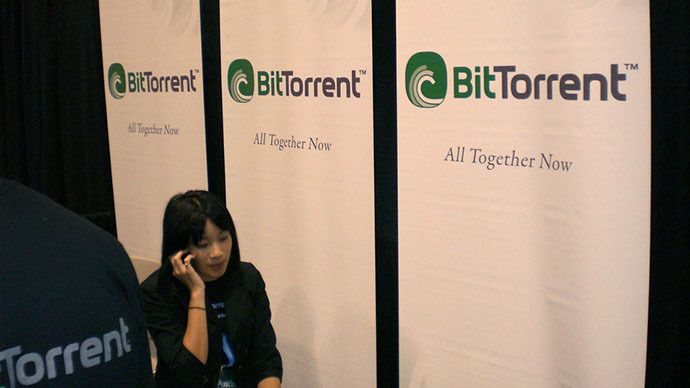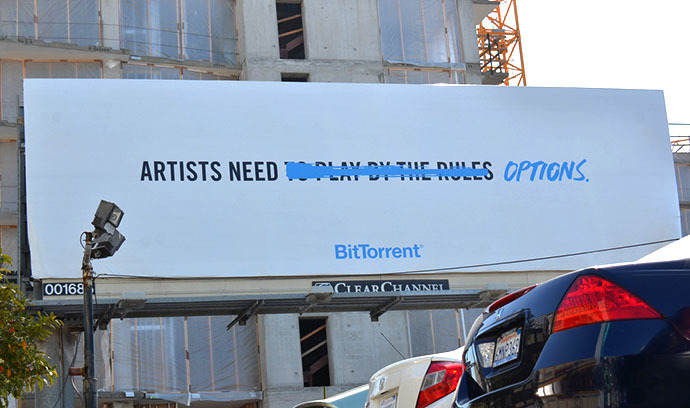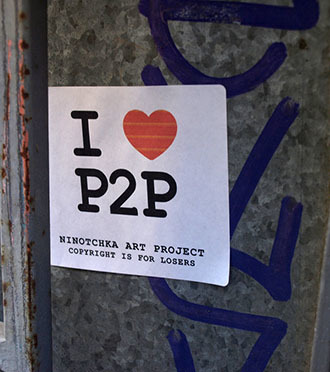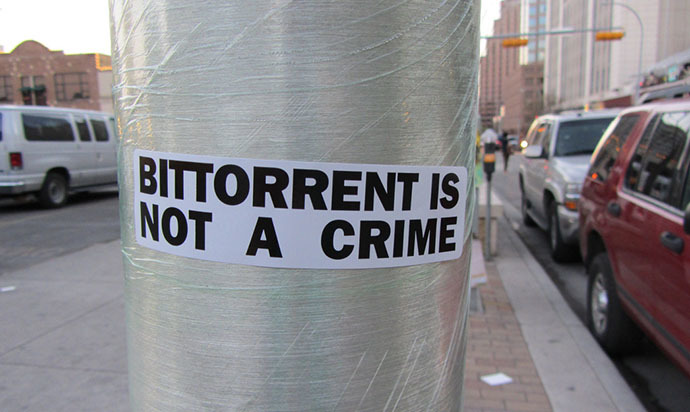BitTorrent ethics: Punishing piracy or criminalizing sharing?

If you live in a densely populated modern city, there is a strong chance that wireless network transmissions that are in breach of copyright law could be around you at this very moment.
The decentralized network architecture known as peer-to-peer
(P2P) communications allows files of all kinds to be shared over
the internet with other users without monetary exchange, and
millions utilize this technology on daily basis. To some, this
kind of exchange represents a new paradigm shift in sharing arts
and culture that has the potential to empower new content
producers who would have otherwise been consumers, while giving
rise to a new decentralized economic model. To those who have a
stake in maintaining the pre-eminence of copyright laws over the
means of distribution, the millions who utilize these new habits
of consumption are likened to renegade sea-bandits in arms –
pirates – and they need to be stopped.
Most file-sharing is utilized through BitTorrent, and involves a
host website that supports an index of .torrent files that can be
downloaded in separate client applications. The content itself is
not stored on a single centralized hard drive, but rests on the
individual hard drives of millions of users who share their files
through a P2P network, making file-sharing very difficult to
regulate. The kinds of files that are shared range from films and
music to software and e-books. All of it is done without monetary
exchange, just as one would share the same kind of content with a
friend. Much like the printing press, cassette recorders, VCRs,
cable television, mp3 players and the like, the film studios of
Hollywood and the recording industry view such innovations as an
existential threat to their industries - and file-sharing has
become the present day object of a witch-hunt led by the Motion
Picture Association of America (MPAA) and its counterpart, the
Recording Industry Association of America (RIAA).
Internet 2.0
Before the digital age, information was exchanged through bulky bundles of paper and plastic discs. The internet was originally developed as a means to circumvent these physical limitations by creating a decentralized network that would allow users to connect to each other irrespective of their physical location. From the perspective of the file-sharer, the internet is functioning exactly as it was intended to. For the intellectual property industries that are bent on punishing offenders of copyright law (people who exchange copyrighted files), the internet cannot be allowed to exist as it does now. As a result of massive lobbying efforts, trends are emerging among lawmakers to develop far-reaching regulations to govern the internet and inalterably change the way it operates. The bottom line is that industries and the corporations that control them want to pass regulation to give the private sector sweeping central authority over the internet and its content under the guise of protecting intellectual property rights, while vastly expanding the duration of existing copyrights.

The unregulated internet is arguably the most representative and democratic feature of industrial societies, and the ideology of ‘copyright fundamentalism’ threatens this medium of exchange. Because file-sharing is done through private means and decentralized networks, copyright law cannot be enforced without violating the privacy of individual users through mass surveillance that would monitor sharing habits. What could the regulated Internet 2.0 look like? Based on the fine print of bills that have failed to become law, a few ideas come to mind. Websites and blogs can be taken down without court order over the most marginal cases of copyright infringement; file-sharers would have their bandwidth cut for using P2P and be subject to pay steep fines; invasive hard drive searches by police and immigration officials at airports, and more. The end-game for corporate lobbyists is to persuade governments to deregulate and liberalize markets and economic space while regulating communication mediums like the internet to protect the deregulation of the economic space that protects corporate monopoly profits. It’s liberty for the markets. Not for you.
I’m in the empire business
The familiar defense of copyright advocates is that freely
sharing content is harmful to the content producers themselves,
and if sharing continues unabated, the entertainment industry
will go bankrupt and creativity would be paralyzed. This line of
thinking does not hold water. The television drama Breaking Bad
has become a cultural phenomenon, and over three million users
downloaded its recent series finale. The show’s creator Vince
Gilligan told media that illegal downloading raised the show’s
brand awareness and led to a lot of people watching the series
who otherwise would not have been. Studies published by the
London School of Economics and Political Science suggest that
file-sharing has a positive effect on creative industries, and
the authors of the report suggest that copyright enforcement
policies should be decided more objectively. According to the
report’s findings, the creative industries are not in terminal
decline, and even in the P2P age, Hollywood achieved
record-breaking global box office revenues of $35 billion in
2012, while the music industry’s revenue from digital sales and
live performances comfortably compensated losses from declining
CD sales.

Other studies conducted in Sweden, Norway, and the UK actually
show that revenues for labels have decreased, while profits for
artists have increased in the digital age. Artists make far more
money selling their songs digitally than the pittance they
receive from physical CDs, while copyright infringement through
file-sharing and uploading copyrighted songs on YouTube does far
more to create a buzz. Obscurity is the most significant problem
faced by aspiring musicians, and services like SoundCloud allow
artists to share their work for free through Creative Commons
licenses, which signals a new economic model that more closely
unites artists with their audiences. Research shows that
file-sharers actually spend more money on entertainment than
those who don’t share, so the copyright enforcers shoot
themselves in the foot by going after their best customers. Much
like the protagonist of Breaking Bad - a high school chemistry
teacher turned enterprising meth cook - the enforcers of
intellectual property are in the empire business and they won’t
go quietly as their middlemen status is undermined.
Copyright reform and the P2P renaissance
Even as P2P file-sharing remains technically illegal if
copyrighted content is exchanged, it has incredible potential to
make learning and cultural materials abundantly available to
society. If educational and state institutions embraced the winds
of change instead of pouring resources into policing internet
users, it would have an enormously positive impact that would
generate new revenue streams, more valuable human capital, and
new forms of economic activity. Where roadblocks exist elsewhere,
P2P presents possibilities - not just for education, but also for
self-study through accessing documentaries, text files, or
software that people would not otherwise have access to. If
sharing were utilized instead of criminalized, it would have
transformative results on society, especially low-income
societies that have difficultly accessing higher education and
cultural media.

File-sharing can be ethical and empowering by giving freer access
to software and technologies, and these trends will be hastened
by the growing 3D-printing movement. Governments would also find
that copyright reform to legalize P2P file-sharing that is done
without direct commercial intent would be a greatly popular
measure, especially at the ballot box in wired countries with
large voter bases of people under 40. In international politics,
a firm position on a contentious issue often results in a “red
line” being declared by one of the parties involved. Judging from
the massive public opposition to privatize and regulate the
internet at the behest of copyright cartels, further
criminalizing the non-commercial distribution of works is a “red
line” for millions of people.
The statements, views and opinions expressed in this column are solely those of the author and do not necessarily represent those of RT.
The statements, views and opinions expressed in this column are solely those of the author and do not necessarily represent those of RT.













